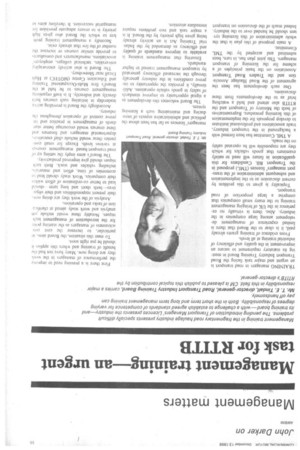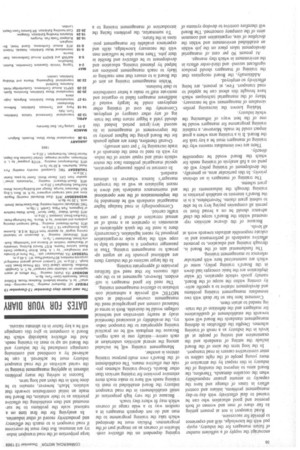John Darker on
Page 57

Page 58

If you've noticed an error in this article please click here to report it so we can fix it.
AMBIM
Management matters
Management training an urgent
task for RTITB
Management training in the fragmentary road haulage industry presents specially difficult problems. The pending introduction of Transport Managers' Licences presents the industry—and its training board—with a challenge to establish agreed standards of competence for varying degrees of responsibility. Both in the short term and long term management training can pay off handsomely.
Mr. T. E. Tindal!, director-general, Road Transport Industry Training Board, carries a major responsibility in this field. CM is pleased to publish this topical contribution by the AT/TB's director-general, TRAINING managers in road transport is an urgent and major task facing the Road Transport Industry Training Board in meeting its statutory requirement to secure an improvement in the quality and efficiency of industrial training at all levels.
From evidence of training grants already paid, it is clear to the Board that there is limited experience of management development among large companies in the industry. Also, there is virtually no experience in the UK of bringing management training to the many small companies that comprise a large proportion of road transport.
Topicality is given to this problem by current discussion as to the implementation and subsequent administration of the transport managers' licences (TML) proposed in the Transport Bill. Candidates for this qualification in future will need to satisfy examiners that goods vehicles for which they are responsible will be operated safely on the roads.
A TML Committee has been formed with a background in the transport industry, trade associations and professional institutes to develop proposals for the implementation of this licensing procedure. Representatives of both the Ministry of Transport and the RTITB also attend and hold a watching brief as to the developments from these discussions.
One such development has been the agreement of the Road Haulage Association and the Traders Road Transport Association on the basic principles of a scheme for the licensing of transport managers. This joint plan has, in turn, been submitted and accepted by the TML Committee.
A main proposal of this plan is that the whole administration of this licensing system should be handed over to the industry. Indeed much of the discussion on transport managers' licences so far has been about the political and administrative aspects of introducing and maintaining such a licensing system.
The Board welcomes this development as a signal opportunity to improve standards of safety in goods vehicle operations. Additionally, it provides the opportunity to improve conditions in the industry generally through the increased efficiency generated by transport management trained to higher standards.
Ensuring that management training is available to improve standards of quality and efficiency as demanded by the Industrial Training Act is an activity already being given high priority by the Board. It is a major task and two problems require immediate attention. First there is a pressing need to improve the performance of managers in the work they are doing now. Many have not had the benefit of training and where this applies it should be put right Soon.
To meet this situation, the Board aims. in particular, to increase the cost con sciousness of managers as the starting point for the introduction of management techniques. Notably these would include joo analysis and work study aimed at clarification of tasks and operations.
Analysis of the work they are doing now, their present responsibilities and their objec tives—both short, and long term-should lead to better co-ordination of effort within their companies. Work study should lead to economies of time, effort and materials. including vehicles and stock. Both tech niques should give improved productivity. The Board's aims imply the setting up or road-transport-based management courses at various levels. Except for small corn panies these would include chief executivo, departmental managers and foremen and these courses would encourage better stan dards of management in practice and im prove control of operation ,throughout the industry.
Accordingly the Board is providing active leadership in initiating such courses both directly and indirectly. It is itself organising management courses to be held at the Board's first Multi-Occupational Training and Education Centre (MOTEC) at High Ercall near Shrewsbury.
The Board is also actively encouraging universities, technical colleges, employers' associations, manufacturers and consultants to provide similar courses or increase the number of the few that already exist.
Secondly a management training pron lem to which the Board also gives high priority is to ensure adequate provision for managerial succession. It therefore aims to encourage the supply of a sufficient number of futUre managers for the industry, equipped with the knowledge, skill and experience to provide for succession.
Road transport is not at present getting its fair share of men and women of both promise and good education who can be trained to deal effectively with day-to-day management problems, initiate and control affairs in times of change and have the capacity to assume greater responsibility when the occasion -demands. Therefore, the Board aims to improve the standing of the industry in this respect by the attraction of More young people of the right calibre to enter constructive careers in road transport.
In the long term the aims of the Board include the setting of standards and the examination and testing of people at all levels in the industry as a result of training schemes. Despite the difficulties in defining management standards the Board will work towards the establishment of qualifications for managers and the definition of the training needed to attain them.
Comment here has so far dealt with two immediate management training problems and development relative to a specific activity coming within the scope of the Board, namely goods vehicle operation. Of wider iinplication are the basic concepts laid down in the Board's training policy, some of which are summarized here with particular reference to management training.
The fundamental aim of the Board is, through training and education, to promote effective standards of performance and inculcate responsible attitudes towards work at all levels.
Because of the diverse activities represented within the Board's scope the chief advance should be on a broad front to permit all companies paying levy to be able to submit grant claims. Nevertheless, it is in the Board's interests to establish priorities in training through the inducements Of the . grant scheme.
The training of managers is an obvious priority. In this particular area, as generally, the development of training policy will depend on a full analysis of training needs for which the Board would be responsible directly.
There are two immediate reasons why the training of managers must be a key task for the Board. It is a training area where a great impact could be made. Moreover, a realistic training programme for managers would be one of the best ways of influencing the whole industry.
Making known the increasing professionalism of management will be necessary. Many of the managerial techniques which have brought this about can be applied to road transport. Few, at present, are being effectively so employed.
Additionally, the Board recognizes that the training of Managers should produce significant secondand third-order effects in the environment in which they manage.
At present 90 per cent of managerial development takes place on the job within an established environment and within the discipline of size, organization and common aims of the company concerned. The Board will therefore contrive to develop systems of
tithing dependent on the effective conibination of courses as an integral part of the programmes. Policies must be developed which take the training programme to the man and do not despatch managers in a random way to a wide range of courses which may fit where they touch.
Because of the very high proportion of small establishments in the road transport industry the Board established to meet its
training needs will have to make much more extensive provision for training services than
other Boards. Group training schemes provide Otte effective means. The establishment of the Board's own multi-purpose training centres is another.
Management training wilt be included among the several activities undertaken at each centre—initially one in each region.
Because the emphasis will be on practical training appropriate to the transport indus try, the availability of associated theoretical study at nearby universities and technical colleges would be desirable. Both in terms of balanced content and geographical need the management courses provided at each MOTEC will provide a substantial contribution to effective management training.
The need for good managers is selfevident. However, agreement as to the.specific reasons for that need will facilitate provision Of appropriate training.
In the larger sections of the industry there are additional grounds for an urgent ap proach to management training. Thus in passenger transport it is needed to help to cope with the large scale re-organization proposed by recent legislation. Concurrently there is need for the quick applications of economies in operation as a result of an annual retraction of about 5 per cent in traffic carried.
Correspondingly in road haulage higher managerial standards will be demanded by the implementation of the new operational and maintenance standards laid down in recent legislation as well as the transport manager's licence whatever its ultimate standard.
In contrast to public passenger operation, special managerial problems face the motor vehicle retail and repair sector of the industry with its need to meet the demands of a trade increasing by 7 per cein annually.
Overall therefore, there are ample gounds for the Board giving the highest priority to the improvement of management in its second levy /grant period. Indeed this should yield a bigger return than the train ing of any other category of employee.
Conversely the cost of training other employees could be largely wasted if indifferent managers failed to organize and motivate staff to make a better contribution
to their business.
Within Management training an aim of the Board is to ensure that men reaching or likely to reach management positions are helped by planned training, education and development to be effective and flexible in their jobs. There must also be sufficient men with the necessary knowledge, skills and experience available for management positions in the future.
To summarize, the problems facing the introduction of management training to a large proportion of the road transport industry are immense. But they must be overcome if road transport is to match the efficiency and productivity record of other industries.
In analysing for the first time on a national scale the problems to be surmounted and then establishing the effective priorities as to their solution, the Board has made an initial contribution towards that solution. Much, however, remains to be done both in the short and long term.
Success in solving the many problems inherent in applying management training to the varied activities of the road transport industry must be achieved. It can be achieved by a combined and continuing campaign conducted by . the industry and the Board set up to meet its training needs. And the effective leadership which the Board is competent to give this campaign will be a key factor in its ultimate success.












































































































